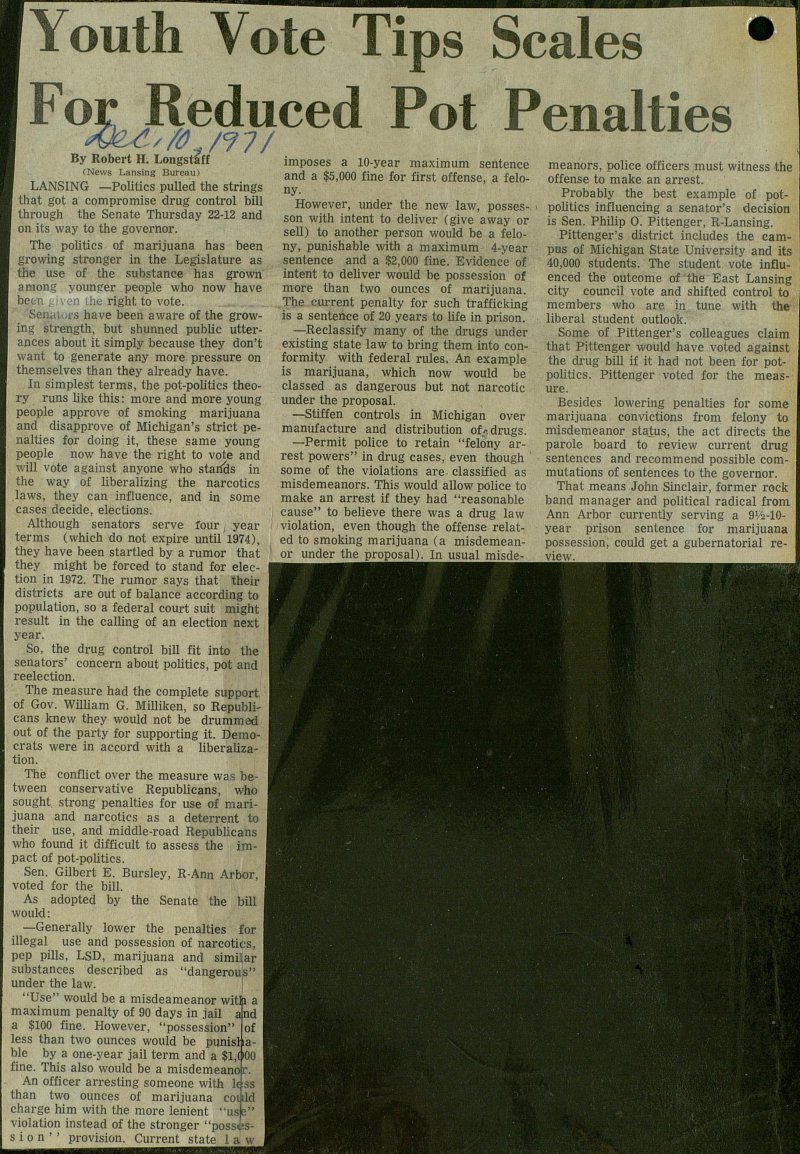Youth Vote Tips Scales For Reduced Pot Penalties

LANSING -Politics pulled the strings that got a compromise drug control bilí through the Senate Thursday 22-12 and on its way to the governor. The politics of marijuana has been growing stronger in the Legislature as the use of the substance has grown among youneer people who now have Lhe right to vote. Senators have been aware of the growing strength, but shunned public utterances about it simply because they don't want to genérate any more pressure on themselves than they already have. In simplest terms, the pot-politics theory runs like this: more and more young people approve of smoking marijuana and disapprove of Michigan's strict penalties for doing it, these same young people now have the right to vote and will vote against anyone who staríds in the way of liberalizing the narcotics laws, they can influence, and in some cases decide, elections. Although senators serve iour , year terms (which do not expire until 1974), they have been startled by a rumor that they might be forced to stand for election in 1972. The rumor says that their districts are out of balance according to population, so a federal court suit might result in the calling of an election next year. So, the drug control bilí fit into the senators' concern about politics, pot and reelection. The measure had the complete support of Gov. William G. Milliken, so Republicans knew they would not be drummed out of the party for supporting it. Democrats were in accord with a liberalization. The conflict over the measure was between conservative Republicans, who sought. strong penalties for use of marijuana and narcotics as a deterrent to their use, and middle-road Republicans who found it difficult to assess the impact of pot-politics. Sen. Gilbert E. Bursley, R-Ann Arbor, voted for the bilí. As adopted by the Senate the bill would : - Generally lower the penalties for illegal use and possession of narcotics, pep pills, LSD, marijuana and similar substances described as "dangerous" under the law. "Use" would be a misdeameanor with a maximum penalty of 90 days in jail and a $100 fine. However, "possession" of less than two ounces would be punisl able by a one-year jail term and a $1,( 00 fine. This also would be a misdemeanor. An officer arresting someone with lc ss than two ounces of marijuana could charge him with the more lenient "use" violation instead of the stronger "possession" provisión. Current state 1 a w imposes a 10-year maximum sentence and a $5,000 fine for fírst offense, a felony. However, under the new law, possesson with intent to deliver (give away or sell) to another person would be a felony, punishable with a maximum 4-year sentence and a $2,000 fine. Evidence of intent to deliver would be possession of more than two ounces of marijuana. The current penalty for such trafficking is a sentence of 20 years to life in prison. - Reclassify many of the drugs under existing state law to bring them into conformity with federal rules. An example is marijuana, which now would be classed as dangerous but not narcotic under the proposal. - Stiffen controls in Michigan over manufacture and distribution of drugs. - Permit pólice to retain "felony arrest powers" in drug cases, even though some of the violations are classified as misdemeanors. This would allow pólice to make an arrest if they had "reasonable cause" to believe there was a drug law violation, even though the offense related to smoking marijuana (a misdemeanor under the proposal). In usual meanors, pólice officers must witness the offense to make an arrest. Probably the best example of potpolitics influencing a senator's decisión is Sen. Philip O. Pittenger, R-Lansing. Pittenger's district includes the campus of Michigan State University and its 40,000 students. The student vote influenced the outcome of the East Lansing city council vote and shifted control to members who are in tune with the liberal student outlook. Some of Pittenger's colleagues claim that Pittenger would have voted against the drug bill if it had not been for potpolitics. Pittenger voted for the measure. Besides lowering penalties for some marijuana convictions from felony to misdemeanor status, the act directs the parole board to review current drug sentences and recommend possible commutations of sentences to the governor. That means John Sinclair, former rock band manager and political radical from Ann Arbor currently serving a 9VÍ-10year prison sentence for marijuana possession, could get a gubernatorial review,